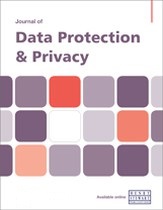Recognising personal data as a digital asset in Dubai
Abstract
Data is misunderstood and misused as the commodity it could be. It is humankind's greatest asset; in short, it is potential. Add to this rapid development of powerful technology, from smartphones to wearables, and the world becomes smaller. People feel more connected, yet personal data feels further away from their control of it.
Technology has largely dominated the perspective of how the future is viewed and shaped, and while data has never been elevated as the driving force behind technology, it is undeniably the heartbeat of (digital) economies globally.
Data privacy law and regulation, often seen as the remaining hope for supporting rights of data owners, has become more fragmented and difficult to implement and with the emergence of the power of processing personal data via autonomous systems such as generative artificial intelligence (AI), it is reaching a pivotal moment.
As virtual and physical worlds merge, autonomous processing of data becomes more prevalent and dominant, and people will seek agency while also desiring the trust to express themselves freely, without the fear of compromising their data and identity. This is perhaps the moment where the collective change of the commonly accepted model of data is needed, to view it instead as a multidimensional, identifiable and ownable thing. Certain countries such as China and the UAE are providing a basis for developing this concept further. The general discussion herein provides the foundations to conclude that Dubai is one of the few cities in the world that can and does change the way the use and ethical processing of personal data is considered, particularly as an asset to the data subject themselves.
The full article is available to subscribers to the journal.
Author's Biography
Michael Clark is a globally recognised data scholar, industry advisor, and innovation evangelist, dedicated to unlocking human potential through data. He has worked with leading global companies such as Mastercard and JP Morgan, and has guided future cities by addressing complex digital and data challenges, envisioning a brighter future. In his ground-breaking book, ‘Data Revolution: Unlocking Human Potential’, Michael outlines how to turn data into a real-world asset to form the foundation of a new economy. This practical guide helps us all prepare for the future by redefining the way we work, reshaping our educational systems and transforming artificial intelligence into a new form of intelligence in partnership with people to lay the groundwork for both current and future generations to realise their full potential.
Lori Baker is a data protection and financial crime regulatory policy expert currently based in Dubai, UAE. She is qualified in both the US and the UK, and is a Fellow of Information Privacy as certified by the International Association of Privacy Professionals. Prior to relocating to Dubai in 2016, Lori was based in London, UK, for 10 years. She worked for Fieldfisher LLP as a senior privacy and cybersecurity associate, and served as in-house counsel for British Telecom, Orange Business Services and Dun & Bradstreet as EU DPO. Lori received her Bachelor of Arts degree at DeSales University followed by Widener University School of Law. While there, Lori enrolled in its Geneva International Law Institute, directed by instructors from the WTO, the UN, and other international organisations.
